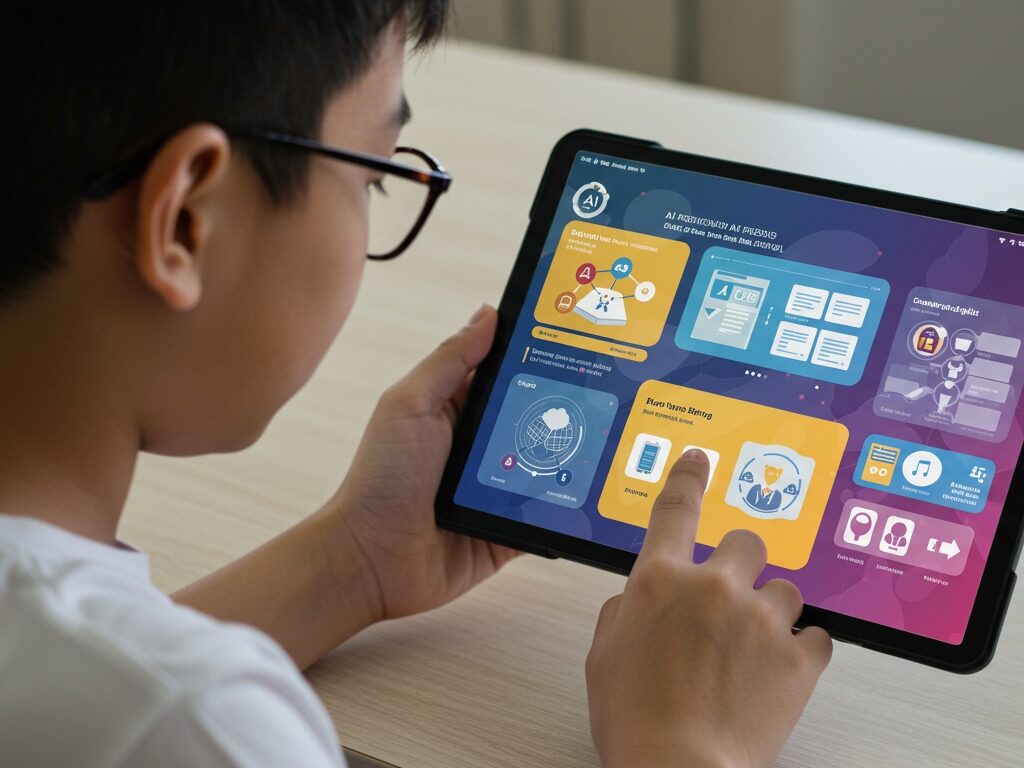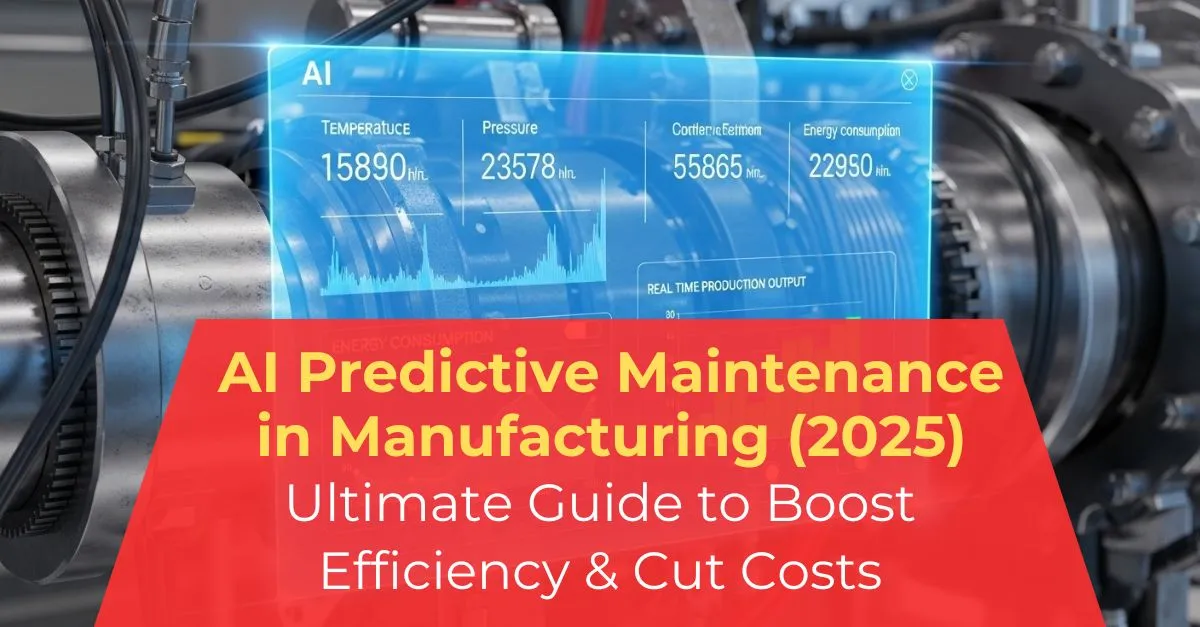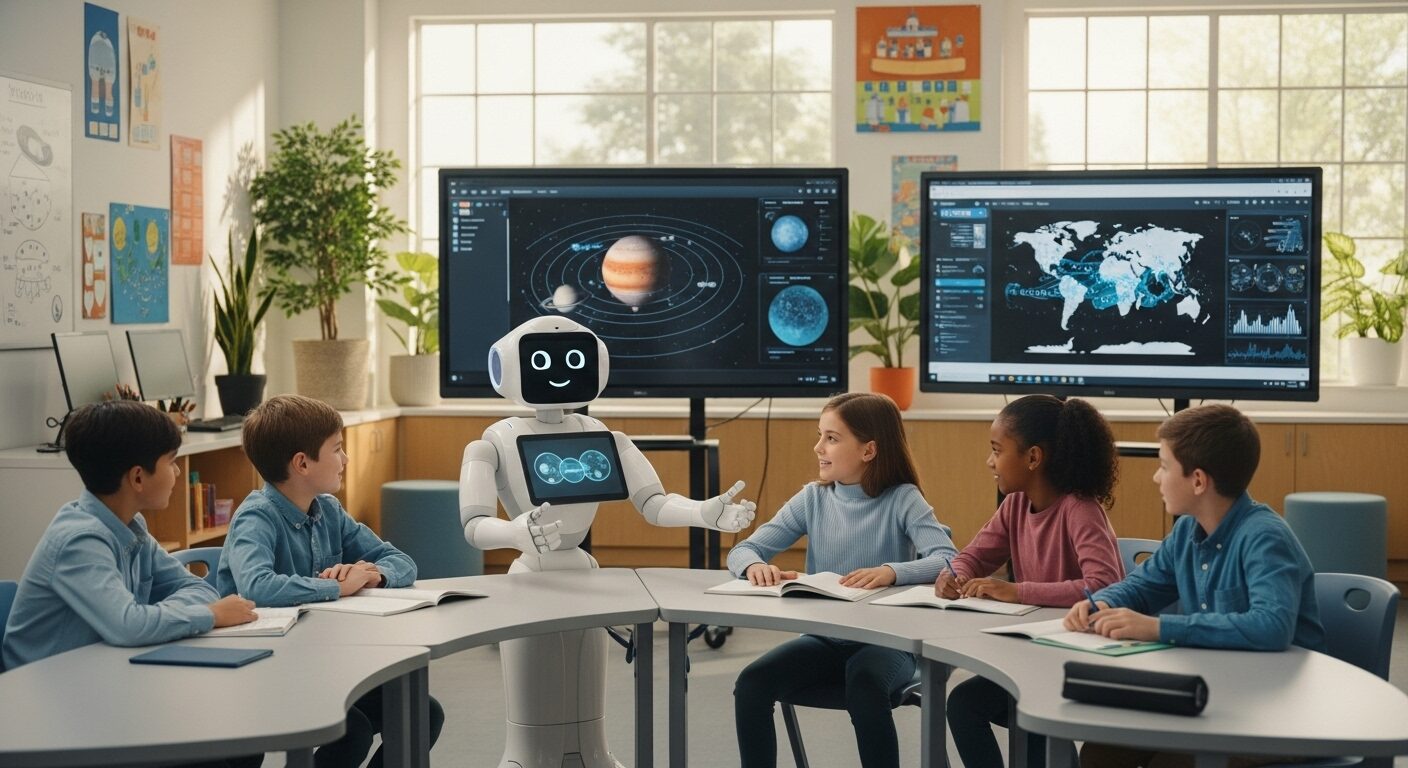Artificial intelligence (AI) is rapidly moving beyond science fiction and into our daily lives. Its impact is now profoundly felt in K-12 education, where it’s revolutionizing how students learn. AI promises to transform the traditional one-size-fits-all approach into deeply personalized learning pathways. This shift aims to meet the unique needs of every student, from kindergarten through high school.
Key Takeaways:
- AI enables truly personalized learning experiences in K-12 by adapting content and pace to individual student needs.
- Core AI applications include adaptive learning platforms, intelligent tutoring systems, and automated assessments.
- AI empowers teachers by automating administrative tasks and providing valuable insights into student progress.
- Addressing concerns like data privacy, equity, and the evolving role of teachers is crucial for successful AI integration.
- The future of AI in K-12 education points towards more inclusive, engaging, and effective learning environments for all.
For decades, educators have strived for “personalized learning.” This concept involves tailoring the educational experience to fit each student’s unique strengths, weaknesses, interests, and learning pace. Historically, achieving this on a large scale in a classroom of 30 or more students has been incredibly challenging. Now, AI offers the tools to make this long-held dream a reality.
What is Personalized Learning in K-12?
Personalized learning goes beyond simply differentiating instruction. It’s about creating a dynamic, adaptable educational journey for each child. This includes custom lesson plans, resources, and assessments that evolve with the student’s progress. The goal is to maximize understanding and retention of material.

How AI Fuels Personalization: Key Applications
AI algorithms analyze vast amounts of student data. This includes test scores, homework submissions, engagement levels, and even real-time interactions. By identifying patterns, AI can predict where a student might struggle or excel. This allows for targeted support and resources.
Adaptive Learning Platforms
These platforms are perhaps the most direct application of AI in personalized learning. They adjust the difficulty, content, and pace of lessons based on a student’s performance. If a student grasps a concept quickly, the platform moves them forward. If they struggle, it provides additional exercises, instructional videos, or different explanations.
Examples like DreamBox Learning and ALEKS utilize sophisticated adaptive algorithms for math and reading. They offer real-time feedback and dynamic learning paths. This ensures students progress at their optimal pace.
Intelligent Tutoring Systems (ITS)
ITS are AI-powered software designed to mimic the guidance of a human tutor. These systems assess a student’s knowledge and adapt instructional strategies accordingly. They provide personalized feedback and support, allowing for targeted remediation. ITS can help students understand complex concepts and improve academic performance.
Content & Curriculum Customization
AI can help craft educational content tailored to individual student needs and preferences. It can present information in various formats like videos, interactive simulations, or text-based materials. AI can also suggest supplementary resources and enrichment activities aligned with a student’s interests. This makes learning more engaging and relevant.
Automated Assessment & Feedback
AI streamlines the grading process for routine tasks, such as multiple-choice questions or short essays. This frees up teachers to focus on more meaningful interactions. AI also provides students with instant, detailed feedback. This helps them identify strengths and weaknesses immediately.

Beyond Academics: Supporting the Whole Child
AI’s role extends beyond core subjects. It can improve accessibility for students with disabilities, offering features like real-time translations or alternative content formats. By analyzing learning patterns, AI can also help identify disengaged or struggling students early. This allows for timely intervention and support.
Benefits for Students, Teachers, and Parents
- For Students: Increased engagement, improved comprehension, a sense of ownership over their learning, and the ability to learn at their own pace.
- For Teachers: Reduced administrative burden, data-driven insights to inform instruction, more time for one-on-one support and creative lesson planning, and the ability to differentiate instruction effectively.
- For Parents: Better understanding of their child’s progress, proactive identification of learning gaps, and assurance that their child is receiving tailored support.
Addressing the Elephant in the Room: Challenges and Considerations
While the potential of AI is vast, its integration into K-12 education comes with critical challenges. These concerns are frequently discussed in forums like Reddit and Quora, reflecting real-world anxieties from parents, educators, and students.
Data Privacy & Security
AI systems rely heavily on student data, raising significant privacy concerns. This includes sensitive information about academic performance, behavior, and even biometric data. Ensuring the security of this data and protecting it from breaches is paramount. Schools must implement robust measures like encryption, access controls, and regular security audits.
On Reddit, users often voice fears about “big tech” collecting student data and potential misuse. There’s a strong call for transparency from schools and vendors about data collection and usage.
Digital Divide & Equity
Not all students have equitable access to technology or reliable internet at home. This “digital divide” could exacerbate existing inequalities if AI education tools aren’t implemented thoughtfully. Schools must ensure that AI benefits all students, regardless of their socioeconomic background.
Teacher Training & Evolving Roles
Teachers need comprehensive training to effectively integrate AI tools into their teaching practices. The role of the teacher is evolving from a disseminator of information to a facilitator and mentor. Concerns like “will AI replace teachers?” are common. The consensus is that AI should augment, not replace, human connection and teaching.
Over-reliance on Technology
A concern frequently seen on platforms like Quora and Reddit is that excessive reliance on AI might diminish critical thinking and problem-solving skills. There’s a fear that students might use AI as a shortcut for learning, rather than a tool to deepen understanding. Balancing AI use with traditional learning methods is key.
The Future of Learning: What’s Next?
The future of AI in K-12 education is promising. It offers the potential for more engaging, accessible, and personalized learning experiences. We can expect more sophisticated adaptive learning tools, immersive virtual classrooms, and AI-powered assessments. These innovations will continue to enhance both teaching efficiency and student engagement.
The key will be a careful, considered approach. Investment in infrastructure, continuous teacher training, and robust ethical frameworks are essential. This ensures AI supports human connection in the classroom, fostering well-rounded individuals ready for a rapidly changing world.
Conclusion
AI is not just a technological fad in K-12 education; it’s a transformative force. By creating truly personalized learning pathways, it addresses the unique needs of every student. While challenges like data privacy and equitable access must be proactively managed, the benefits for students, teachers, and parents are immense. As AI continues to evolve, it will undoubtedly shape a more effective, engaging, and equitable educational landscape for the next generation.
Frequently Asked Questions (FAQ)
Q1: Will AI replace teachers in K-12 classrooms?
No, AI is not intended to replace teachers. Instead, it serves as a powerful tool to support and empower them. AI automates routine tasks, provides data insights, and personalizes content, freeing teachers to focus on higher-level instruction, mentorship, and building vital student relationships.
Q2: How does AI truly personalize learning for my child?
AI personalizes learning by analyzing your child’s individual learning style, pace, strengths, and weaknesses through their interactions with educational platforms. It then customizes lesson plans, adjusts content difficulty, suggests relevant resources, and provides targeted feedback in real time, ensuring a unique and effective learning journey.
Q3: What are the main privacy concerns with AI in schools?
The primary privacy concerns involve the collection, storage, and usage of sensitive student data by AI systems. This includes ensuring data security against breaches, preventing misuse of personal information, and maintaining transparency about how data is used. Robust policies and teacher training are crucial to safeguard student privacy.
Q4: How does AI help students with different learning abilities?
AI can significantly improve accessibility and inclusivity. It can provide customized content formats, real-time translations for language learners, and alternative learning pathways for students with disabilities. AI also helps identify learning gaps early, allowing for targeted support and interventions for struggling students.
Q5: Is AI only for academic subjects, or does it help in other areas?
While AI is widely used in academic subjects like math and reading, its benefits extend beyond. It can help in identifying student engagement levels, supporting emotional and social development through tailored feedback, and even assist with administrative tasks that indirectly benefit the student experience by giving teachers more time for direct interaction.
















[…] Learning & Education: Create personalized study plans, generate quiz questions, or get explanations for complex concepts. The ability to interact with an AI tutor offline is a game-changer for many students. For more on AI’s transformative role in learning, explore how AI is revolutionizing personalized learning pathways. […]
[…] AI in K-12: Revolutionizing Personalized Learning Pathwaysby Prateek VishwakarmaAugust 20, 2025Artificial intelligence (AI) is rapidly moving beyond science fiction and into our daily lives. Its impact is now profoundly felt in […]